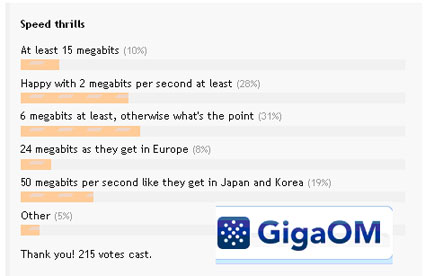
Here I thought my hefty monthly cable bill paid for a broadband connection, but it turns out we haven’t yet decided what broadband is. Congress is in the process of defining “true broadband” and Om Malik is surveying actual broadband users about what constitutes high speed. (So far 6 Mbps is winning out – See Above)
The issue really driving this debate is the disparity of connection speeds across the US. We can complain all we want in metropolitan areas that there’s not enough bandwidth to watch P2P HDTV online 24 hours a day, but the real problem is in rural areas where there is no broadband, even by today’s definition of 200 kpbs. Already the US isn’t doing so hot in global broadband penetration rank (though the Verizon policy blog has a very thorough discussion of why things aren’t as bad as they seem). Raise the standard and our rank may plummet further.
Aside from rank, however, redefining broadband should give legislators the ammunition they need to keep the pressure for greater bandwidth on. What operator wants to have its service demoted from the category of broadband? What would they call it? Not-too-slow speed?
You should check out Larry Cohen’s comments on this at Senator Markey’s subcommittee hearings last wee. The site also has a good speed test that compares your speed to others in your state, the country and the world plus some policy suggestions. Check it out. http://www.speedmatters.org. It also has some info on Verizons attempt to red-line certain “non-profitable areas.” Yes, their FIOS product is fast, but they don’t want to deploy it everywhere.